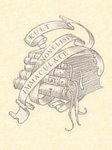I picked up a story yesterday that I'd started a month ago. It's a fun idea, eventually mixing it up with some pirates, but it is also a historical piece, which means . . . research.
I don't go all out with my research for a rough draft, though. Too much about the story is unclear at that point and researching too deeply would only be a waste of time at that point. I research the relevant time period as much as I need to. Having a couple of degrees grounded in the study of History at least means I have working knowledge of my favorite historical eras and how to do a basic brush-up on the period in question without going overboard, but you don't have to have contributed vasts amount of money that will take you to next 30 years to pay off in student loans to be able to do basic research. All you need is a computer and an online connection. And know the secret word.
Wikipedia.
The trick to researching with Wikipedia is to understanding the source. Actually, that's the trick to any research. Know your source! Wikipedia is an encyclopedia that anyone, and that means you, too, can add to, edit, and change. Which means there is a lot of information from knowledgeable sources, and there is a lot that, well, isn't so good.
But just like a paper encyclopedia, it can get you started. Names and dates are usually trustworthy enough. Chronological events that might be listed in any survey text are usually safe, too. And when you get into the details, you just have to use your gut and a little detection. Is the passage cited? (that's a good sign, but check the citation) Are there quotes that read like a movie script? (not a good sign, and I've seen some of these) Are there links at the bottom of the entry? Those links will help you round out your research, especially if they link to a museum or .edu website. Those are trustworthy enough sites for initial research. But if you get Bob's homepage on all things Elizabethan, beware. Not a credible source to use, unless Bob happens to be Dr. Soandso of Oxford with a focus on the Elizabethan era.
Know your sources!
But since this is just beginning research, I'm not diving that deep, yet. I just want the basic facts of the era, some names and dates and places, some chronology of events. From that, I'll start getting a sense of where my character is amid it all, and sometimes, find an event, usually a small, lesser known event, that the character might become involved in. Say, like FDR's signing of the first 100 days of the New Deal. Or the assassination of William the Silent. Or the death of Marc Antony. All of these are plot points in stories I'm working on. (not all the same story, though. I don't know time travel.)
The other trick to researching for first drafts is not to research everything at once. Because usually, I don't know what I need. I do a search for just the year the story is set, first, then go about about ten years to see what sort of events have shaped my character's world. Then, when I need more info, I look it up. Like, say, an officer's rank in Rome's legion. Or the name of an earldom in Elizabethan England.
After the first draft is finished and I have a sense of where the story is going to go and what all is involved, then I hit the books. Because no amount of internet research can make up for real book-learning. And those sources are THE sources.
So say it with me now: Know your sources! And add to that: The library is your friend.
But Wikipedia is a good buddy to know, too. Just don't trust everything he says.
Tuesday, April 3, 2007
Subscribe to:
Post Comments (Atom)







No comments:
Post a Comment